Classical Music CDs Round-Up 9 | reviews, news & interviews
Classical Music CDs Round-Up 9
Classical Music CDs Round-Up 9
This month's recommended releases
CD OF THE MONTH
Alfredo Casella: Symphony no.2, Op.12, Scarlatianna, Op.44
BBC Philharmonic/Noseda, with Martin Roscoe (piano) (Chandos)
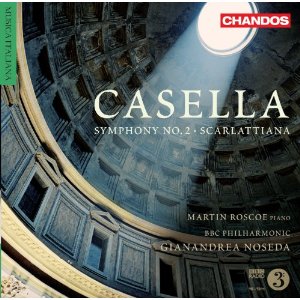 Alfredo Casella (1883-1947) was a passionate advocate of Mahler’s music, and it was through his advocacy that the the older composer was able to conduct his Second Symphony in Paris in 1910. Casella had trained at the Paris Conservatoire and was keen to establish himself as a writer of instrumental music, to resist the "tyranny of opera". The extravagant, expansive Second Symphony, completed in 1910, betrays Mahler’s influence in its march rhythms and ripe harmonic palette, but that’s about as far as the resemblance goes. Casella had scores of imaginative ideas of his own, but could lack the skills required to organise them effectively. There’s a whiff of Hollywood in some of the more garish moments. It’s all terrifically impressive, but occasionally exhausting: themes come and go, tempi change abruptly, so at times it seems just a little too episodic to convince as a symphony. Still, Gianandrea Noseda’s performance is breathtaking, with the BBC Philharmonic revelling in Casella’s outlandish colours. There are many moments to savour, my favourites being the tolling bells in the opening movement and the virtuosic brass writing in the scherzo. By the time you reach the closing Epilogo you’ve given up protesting and wallow in the music’s splendour. After which, we get Scarlattiana, a 1926 work for piano and small orchestra based on originals by Scarlatti. Casella is more respectful in his treatment of the source material than Stravinsky was in Pulcinella, it’s delightful, effervescent stuff. Find Casella on Amazon
Alfredo Casella (1883-1947) was a passionate advocate of Mahler’s music, and it was through his advocacy that the the older composer was able to conduct his Second Symphony in Paris in 1910. Casella had trained at the Paris Conservatoire and was keen to establish himself as a writer of instrumental music, to resist the "tyranny of opera". The extravagant, expansive Second Symphony, completed in 1910, betrays Mahler’s influence in its march rhythms and ripe harmonic palette, but that’s about as far as the resemblance goes. Casella had scores of imaginative ideas of his own, but could lack the skills required to organise them effectively. There’s a whiff of Hollywood in some of the more garish moments. It’s all terrifically impressive, but occasionally exhausting: themes come and go, tempi change abruptly, so at times it seems just a little too episodic to convince as a symphony. Still, Gianandrea Noseda’s performance is breathtaking, with the BBC Philharmonic revelling in Casella’s outlandish colours. There are many moments to savour, my favourites being the tolling bells in the opening movement and the virtuosic brass writing in the scherzo. By the time you reach the closing Epilogo you’ve given up protesting and wallow in the music’s splendour. After which, we get Scarlattiana, a 1926 work for piano and small orchestra based on originals by Scarlatti. Casella is more respectful in his treatment of the source material than Stravinsky was in Pulcinella, it’s delightful, effervescent stuff. Find Casella on Amazon
OTHER RELEASES
Britten: Songs and Proverbs of William Blake
Gerald Finley (baritone), Julius Drake (piano)
(Hyperion)
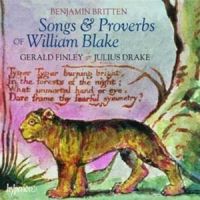 Britten’s vocal music will forever be associated with the characteristic tenor voice of Peter Pears, but this issue collects some of his settings for baritone. Hyperion cannily start this recital with four folk-song settings. Composed throughout Britten's career, they are exquisite, the restraint of his piano writing combined with the Canadian baritone Gerald Finley’s wonderfully expressive voice completely erasing memories of Dudley Moore’s Britten/Pears send-up performed in Beyond the Fringe (but see a clip below to remind yourself). The main attraction on this disc is the cycle Songs and Proverbs of William Blake, composed for and dedicated to the great German baritone Dietrich Fischer-Dieskau in 1965. Britten’s language is here more exploratory, making limited use of twelve-note techniques, though always within a firmly tonal framework. As ever with this composer, the mood is frequently pitch-black, with A Poison Tree particularly chilling. It’s fascinating to compare it to Britten’s 1935 setting of the same text, more declamatory but equally effective and easily recognisable as coming from the same pen. Following the Blake settings with the 1968 cycle Tit for Tat feels like emerging from a dark room into warm sunshine. Britten’s five short songs, settings of Walter de la Mare, were originally composed as a teenager, and were later ‘cleaned very slightly’. The mood is so much warmer, less claustrophobic. Finley sings them complete sincerity and affection. The disc ends with more folk-song arrangements, some published posthumously. Finley has a brave stab at a country yokel accent in the Bird Scarer’s Song, and Julius Drake’s piano accompaniments are exemplary. Nice cover too. Find Britten on Amazon
Britten’s vocal music will forever be associated with the characteristic tenor voice of Peter Pears, but this issue collects some of his settings for baritone. Hyperion cannily start this recital with four folk-song settings. Composed throughout Britten's career, they are exquisite, the restraint of his piano writing combined with the Canadian baritone Gerald Finley’s wonderfully expressive voice completely erasing memories of Dudley Moore’s Britten/Pears send-up performed in Beyond the Fringe (but see a clip below to remind yourself). The main attraction on this disc is the cycle Songs and Proverbs of William Blake, composed for and dedicated to the great German baritone Dietrich Fischer-Dieskau in 1965. Britten’s language is here more exploratory, making limited use of twelve-note techniques, though always within a firmly tonal framework. As ever with this composer, the mood is frequently pitch-black, with A Poison Tree particularly chilling. It’s fascinating to compare it to Britten’s 1935 setting of the same text, more declamatory but equally effective and easily recognisable as coming from the same pen. Following the Blake settings with the 1968 cycle Tit for Tat feels like emerging from a dark room into warm sunshine. Britten’s five short songs, settings of Walter de la Mare, were originally composed as a teenager, and were later ‘cleaned very slightly’. The mood is so much warmer, less claustrophobic. Finley sings them complete sincerity and affection. The disc ends with more folk-song arrangements, some published posthumously. Finley has a brave stab at a country yokel accent in the Bird Scarer’s Song, and Julius Drake’s piano accompaniments are exemplary. Nice cover too. Find Britten on Amazon
Watch Dudley Moore sending up Britten
Janáček: The Excursions of Mr Brouček
Bohumir Vich, Ivo Židek, Libuše Domanǐnská, Prague National Theatre Orchestra/Václav Neumann
(Supraphon)
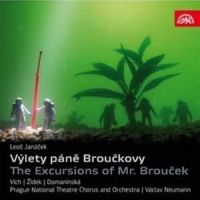 Janáček’s only venture into comedy, this delightful opera is now reissued in a vintage early 1960s performance, the work’s first recording. Recently revived by Opera North, it’s a quirky piece which comes across well on disc, as Bělohlávek’s recent BBCSO version on Deutsche Grammophon demonstrated. In two self-contained parts, it tells the story of an inebriated Prague landlord who enjoys two imaginary voyages - to the moon, and back in time to the 15th century. The farce of the early scenes can come across as a little laboured, as Brouček offends the aesthete moon-dwellers by eating pub sausages, but much of the music is sublime, mature Janáček, in particular a rapturous orchestral interlude accompanying the anti-hero’s voyage home on a winged horse. The second half, set in 1420, is strikingly different in character – more dramatic and strident, with some especially effective chorus writing. Recorded in the dark days of the Cold War, this performance contains some state-ordained changes to the libretto, with several discussions about religion apparently considered off-limits in 1962. The vintage recording still sounds amazingly clear, and the whole enterprise has a real theatrical buzz about it; Janáček’s mercurial mood changes confidently negotiated by Václav Neumann’s Prague forces. Bohumír Vich is excellent as Brouček, relishing the composer’s outlandish vocal demands. Alas, there’s no libretto, but you can download one from the Supraphon website. This is a genuine bargain, and as authentic a performance as you’re likely to find. Find The Excursions of Mr Brouček on Amazon
Janáček’s only venture into comedy, this delightful opera is now reissued in a vintage early 1960s performance, the work’s first recording. Recently revived by Opera North, it’s a quirky piece which comes across well on disc, as Bělohlávek’s recent BBCSO version on Deutsche Grammophon demonstrated. In two self-contained parts, it tells the story of an inebriated Prague landlord who enjoys two imaginary voyages - to the moon, and back in time to the 15th century. The farce of the early scenes can come across as a little laboured, as Brouček offends the aesthete moon-dwellers by eating pub sausages, but much of the music is sublime, mature Janáček, in particular a rapturous orchestral interlude accompanying the anti-hero’s voyage home on a winged horse. The second half, set in 1420, is strikingly different in character – more dramatic and strident, with some especially effective chorus writing. Recorded in the dark days of the Cold War, this performance contains some state-ordained changes to the libretto, with several discussions about religion apparently considered off-limits in 1962. The vintage recording still sounds amazingly clear, and the whole enterprise has a real theatrical buzz about it; Janáček’s mercurial mood changes confidently negotiated by Václav Neumann’s Prague forces. Bohumír Vich is excellent as Brouček, relishing the composer’s outlandish vocal demands. Alas, there’s no libretto, but you can download one from the Supraphon website. This is a genuine bargain, and as authentic a performance as you’re likely to find. Find The Excursions of Mr Brouček on Amazon
Kodály: Sonata for Solo Cello; Adagio; Sonatina; Epigrams; Romance Lyrique.
Natalie Clein (cello), Julius Drake (piano)
(Hyperion)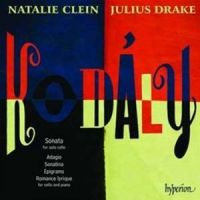 A Hungarian contemporary and friend of Bartók, Zoltan Kodály (1882-1967) was an avid collector of folk music, spending time in the early 1900s with his fellow composer notating traditional music on the verge of extinction. He was also a passionate believer in the importance of music for children, largely responsible for making the Hungarian music education system at one time the envy of the world. Do you remember the hand signals accompanying the UFO’s five-note tune in Close Encounters? Kodály devised them, originally an idea used to demonstrate visually the idea of pitch to children. Natalie Clein’s account of the solo cello Sonata of 1915 is staggering; every technical challenge cleanly surmounted, but pulsating with theatrical life. The range of moods touched upon in the work is enormous, from the declamatory, rhetorical opening paragraph to the central movement’s introspective melancholy. And the folk-inspired fireworks in the closing Allegro molto vivace feel hard-won; it’s a thrilling, heart-wrenching conclusion. The other cello and piano works on the disc can’t help seeming slightly anti-climatic after the Sonata, attractive as they are. The early Romance Lyrique and the Adagio are gorgeous salon pieces; more characteristic is the posthumously published Sonatina from 1922. But it’s the 9 Epigrams from 1954 that I’ll return to most often. These short, folk-inspired works, originally composed as vocal exercises, are jewel-like. Clein and her pianist Julius Drake play them simply, with deep affection and not a hint of condescension. Thrilling, moving, and beautifully recorded – and how refreshing to see a CD by a young female cellist not accompanied by a booklet resembling a Hello! fashion shoot. Find Kodaly on Amazon
A Hungarian contemporary and friend of Bartók, Zoltan Kodály (1882-1967) was an avid collector of folk music, spending time in the early 1900s with his fellow composer notating traditional music on the verge of extinction. He was also a passionate believer in the importance of music for children, largely responsible for making the Hungarian music education system at one time the envy of the world. Do you remember the hand signals accompanying the UFO’s five-note tune in Close Encounters? Kodály devised them, originally an idea used to demonstrate visually the idea of pitch to children. Natalie Clein’s account of the solo cello Sonata of 1915 is staggering; every technical challenge cleanly surmounted, but pulsating with theatrical life. The range of moods touched upon in the work is enormous, from the declamatory, rhetorical opening paragraph to the central movement’s introspective melancholy. And the folk-inspired fireworks in the closing Allegro molto vivace feel hard-won; it’s a thrilling, heart-wrenching conclusion. The other cello and piano works on the disc can’t help seeming slightly anti-climatic after the Sonata, attractive as they are. The early Romance Lyrique and the Adagio are gorgeous salon pieces; more characteristic is the posthumously published Sonatina from 1922. But it’s the 9 Epigrams from 1954 that I’ll return to most often. These short, folk-inspired works, originally composed as vocal exercises, are jewel-like. Clein and her pianist Julius Drake play them simply, with deep affection and not a hint of condescension. Thrilling, moving, and beautifully recorded – and how refreshing to see a CD by a young female cellist not accompanied by a booklet resembling a Hello! fashion shoot. Find Kodaly on Amazon
Schumann: The Symphonies; Konzertstűck for Four Horns
Vienna Symphony Orchestra/Luisi
(Orfeo)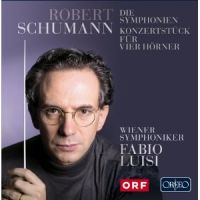 It’s an oft-repeated cliché that Schumann wasn’t a good orchestrator, over-reliant on doublings and fond of thick stodge. I’ve never found this to be the case. Period performances by Gardiner and Norrington have given these symphonies extra zing, but these new live recordings by Fabio Luisi and the Vienna Symphony Orchestra show how Schumann’s ideas can take flight and sing when played on modern instruments. Theirs is a characterful orchestral timbre, rich but transparent, and Luisi’s generally swift speeds give the music plenty of dynamism without sacrificing Schumann’s uniquely warm and big-hearted orchestral sound. The wind and brass writing is superbly projected, the latter helped by rotary-valved trumpets and Vienna-style horns. The layered dissonant chords in the D minor symphony resolve magnificently, and the way in which the winds and horns cut through the strings in the opening movement of the Second is impressive. Best of all is the Third, or Rhenish; the austere beauty of the Cologne Cathedral-inspired fourth section giving way to an exuberant last movement. The generous coupling is the clincher; Schumann’s dazzling, fiendishly virtuosic Konzertstűck for four horns and orchestra. Difficult enough to perform on expensive modern horns, it’s played here on Viennese single F instruments, which is probably like trying to walk the tightrope whilst wearing oversized wellington boots. Luisi’s fearless horns cope brilliantly. Good packaging as well. Is this important? Yes, it is – classical downloads may take up less shelf space but there’s little aesthetic pleasure in an MP3 file stored on a hard drive, as opposed to an attractive shiny card box containing comprehensive sleeve notes along with the CDs. Do yourself a favour and listen to these recordings through a half decent hi-fi, as they sound magnificent. Find Schumann on Amazon
It’s an oft-repeated cliché that Schumann wasn’t a good orchestrator, over-reliant on doublings and fond of thick stodge. I’ve never found this to be the case. Period performances by Gardiner and Norrington have given these symphonies extra zing, but these new live recordings by Fabio Luisi and the Vienna Symphony Orchestra show how Schumann’s ideas can take flight and sing when played on modern instruments. Theirs is a characterful orchestral timbre, rich but transparent, and Luisi’s generally swift speeds give the music plenty of dynamism without sacrificing Schumann’s uniquely warm and big-hearted orchestral sound. The wind and brass writing is superbly projected, the latter helped by rotary-valved trumpets and Vienna-style horns. The layered dissonant chords in the D minor symphony resolve magnificently, and the way in which the winds and horns cut through the strings in the opening movement of the Second is impressive. Best of all is the Third, or Rhenish; the austere beauty of the Cologne Cathedral-inspired fourth section giving way to an exuberant last movement. The generous coupling is the clincher; Schumann’s dazzling, fiendishly virtuosic Konzertstűck for four horns and orchestra. Difficult enough to perform on expensive modern horns, it’s played here on Viennese single F instruments, which is probably like trying to walk the tightrope whilst wearing oversized wellington boots. Luisi’s fearless horns cope brilliantly. Good packaging as well. Is this important? Yes, it is – classical downloads may take up less shelf space but there’s little aesthetic pleasure in an MP3 file stored on a hard drive, as opposed to an attractive shiny card box containing comprehensive sleeve notes along with the CDs. Do yourself a favour and listen to these recordings through a half decent hi-fi, as they sound magnificent. Find Schumann on Amazon
Stravinsky: The Rite of Spring; Revueltas: Night of the Maya
Simón Bolívar Youth Orchestra of Venezuela/Dudamel
(Deutsche Grammophon)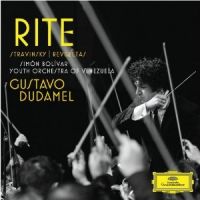 It’s the coupling that makes this disc a must-hear; Mexican composer Silvestre Revueltas’s four-movement suite La noche de los Mayas, drawn from a 1939 film score but not performed until 1960, 20 years after the composer’s early death. Garish, lurid, and hugely enjoyable, it pulsates with colour and exotic, hypnotic rhythm. Revueltas’s musical language is eclectic, with the second movement’s folk dances suggesting Copland’s El Salon Mexico with the rhythmic kinks straightened out. He’s unafraid to present a simple folk melody plain and unadorned where necessary, but also keen to employ lush, impressionist orchestral effects and passages of aggressive, dissonant force. The final Night of Enchantment is a riot, with the orchestral percussion improvising overlapping ostinati to delirious effect. Gustavo Dudamel gives the piece a definitive, exuberant performance, and the work makes an apt partner for another rhythmic tour-de force, Stravinsky’s Rite of Spring. Here, Dudamel’s players don’t bludgeon the listener; as with Stravinsky’s own 1960s recording we’re reminded that this is a ballet score, and that it’s supposed to be danced to. It moves swiftly, with élan, and it’s good to hear some of the subtler orchestral effects; contrabassoons are nicely audible, and so are the incisive string accents in the final Sacrificial Dance. Good quality live recordings, taken from concerts in Caracas earlier this year. Find Stravinsky and Revueltas on Amazon
It’s the coupling that makes this disc a must-hear; Mexican composer Silvestre Revueltas’s four-movement suite La noche de los Mayas, drawn from a 1939 film score but not performed until 1960, 20 years after the composer’s early death. Garish, lurid, and hugely enjoyable, it pulsates with colour and exotic, hypnotic rhythm. Revueltas’s musical language is eclectic, with the second movement’s folk dances suggesting Copland’s El Salon Mexico with the rhythmic kinks straightened out. He’s unafraid to present a simple folk melody plain and unadorned where necessary, but also keen to employ lush, impressionist orchestral effects and passages of aggressive, dissonant force. The final Night of Enchantment is a riot, with the orchestral percussion improvising overlapping ostinati to delirious effect. Gustavo Dudamel gives the piece a definitive, exuberant performance, and the work makes an apt partner for another rhythmic tour-de force, Stravinsky’s Rite of Spring. Here, Dudamel’s players don’t bludgeon the listener; as with Stravinsky’s own 1960s recording we’re reminded that this is a ballet score, and that it’s supposed to be danced to. It moves swiftly, with élan, and it’s good to hear some of the subtler orchestral effects; contrabassoons are nicely audible, and so are the incisive string accents in the final Sacrificial Dance. Good quality live recordings, taken from concerts in Caracas earlier this year. Find Stravinsky and Revueltas on Amazon
Watch Dudamel rehearsing The Rite of Spring:
Walton: Violin Concerto; Symphony No 1
New Haven Symphony Orchestra/William Boughton, with Kurt Nikkanen (violin)
(Nimbus)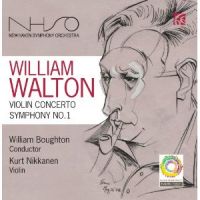 A pleasant surprise from an unlikely source: a provincial American orchestra beginning a recorded cycle of Walton orchestral music with a British conductor. Walton’s First is an iconic 1930s symphony, teeming with fiery energy.In some performances it can also have a belligerent, blustering pomposity, as if the music is crying out loud to be taken Very Seriously Indeed. Are the dark shadows an omen of war, or merely of the composer’s girlfriend troubles? William Boughton’s opening is steady and cleanly articulated, accentuating the dotted rhythms and tiny harmonic changes. The big tuttis are impressive, but so too are the lonely bassoon solos in the central development. And that recapitulation is so crude but so effective; rasping horns in canon with tuba, a final juicy chord and an aggressive cry of triumph in the closing seconds. Both scherzo and slow movement impress through their cool understatement, and Boughton is successful in binding together the disparate elements of the finale. The generous coupling is Walton’s 1939 Violin Concerto which nicely mingles schmaltz with Stravinskian spikiness. It’s beautifully played here by Kurt Nikkanen, clearly unfazed by taking on a work commissioned by Jascha Heifetz. Find Walton on Amazon
A pleasant surprise from an unlikely source: a provincial American orchestra beginning a recorded cycle of Walton orchestral music with a British conductor. Walton’s First is an iconic 1930s symphony, teeming with fiery energy.In some performances it can also have a belligerent, blustering pomposity, as if the music is crying out loud to be taken Very Seriously Indeed. Are the dark shadows an omen of war, or merely of the composer’s girlfriend troubles? William Boughton’s opening is steady and cleanly articulated, accentuating the dotted rhythms and tiny harmonic changes. The big tuttis are impressive, but so too are the lonely bassoon solos in the central development. And that recapitulation is so crude but so effective; rasping horns in canon with tuba, a final juicy chord and an aggressive cry of triumph in the closing seconds. Both scherzo and slow movement impress through their cool understatement, and Boughton is successful in binding together the disparate elements of the finale. The generous coupling is Walton’s 1939 Violin Concerto which nicely mingles schmaltz with Stravinskian spikiness. It’s beautifully played here by Kurt Nikkanen, clearly unfazed by taking on a work commissioned by Jascha Heifetz. Find Walton on Amazon
Wagner: Götterdämmerung
Hallé Orchestra/Elder, with the Hallé Choir, BBC SO Chorus, LSO Chorus, Royal Opera Chorus, with Lars Cleveman (Siegfried), Katarina Dalayman (Brűnnhilde)
(Hallé)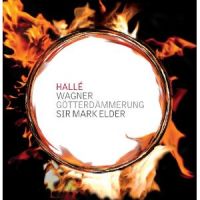 After surreptitiously enjoying a 40-minute orchestral distillation of Parsifal last month, it was initially daunting to be confronted with this hefty five-disc box. Or one mp3 disc, complete with libretto as a PDF file, which needn’t cost much more than a round in the pub – a steal, and a superb introduction to the work. The performance was recorded live, divided over two evenings in Bridgewater Hall last May. Doing the piece over two nights played obvious dividends. You don’t hear any sign of fatigue among the singers and players, a problem that can afflict live opera recordings. Mark Elder’s approach is generally measured and weighty, yet he knows how to give the rhythms enough spring and life to ensure that nothing sounds perfunctory, the big orchestral interludes possessing immense grace as well as muscle. What about the singing? It’s the supporting cast that impress most – Andrew Shore’s Alberich and Attila Jun’s Hagen are both excellent, and the three Rhinemaidens (Katherine Broderick, Madeleine Shaw and Leah-Marian Jones) possess real allure. Lars Cleveman’s is not the most beautiful-sounding Siegfried, but he suggests an edgy, nervy physicality, well-matched by Katarina Dalayman’s Brűnnhilde. All good, but the real attraction is Elder’s rejuvenated, heavily augmented Hallé Orchestra. The playing is astonishingly good, full of boldness and bravado in the more extrovert moments and so expressive, with full, rich string tone. Superb horn solos and stygian Wagner tuba sonorities too. Find Götterdämmerung on Amazon
After surreptitiously enjoying a 40-minute orchestral distillation of Parsifal last month, it was initially daunting to be confronted with this hefty five-disc box. Or one mp3 disc, complete with libretto as a PDF file, which needn’t cost much more than a round in the pub – a steal, and a superb introduction to the work. The performance was recorded live, divided over two evenings in Bridgewater Hall last May. Doing the piece over two nights played obvious dividends. You don’t hear any sign of fatigue among the singers and players, a problem that can afflict live opera recordings. Mark Elder’s approach is generally measured and weighty, yet he knows how to give the rhythms enough spring and life to ensure that nothing sounds perfunctory, the big orchestral interludes possessing immense grace as well as muscle. What about the singing? It’s the supporting cast that impress most – Andrew Shore’s Alberich and Attila Jun’s Hagen are both excellent, and the three Rhinemaidens (Katherine Broderick, Madeleine Shaw and Leah-Marian Jones) possess real allure. Lars Cleveman’s is not the most beautiful-sounding Siegfried, but he suggests an edgy, nervy physicality, well-matched by Katarina Dalayman’s Brűnnhilde. All good, but the real attraction is Elder’s rejuvenated, heavily augmented Hallé Orchestra. The playing is astonishingly good, full of boldness and bravado in the more extrovert moments and so expressive, with full, rich string tone. Superb horn solos and stygian Wagner tuba sonorities too. Find Götterdämmerung on Amazon
REISSUE of the MONTH
Gisela May: Brecht Songs - settings by Weill, Dessau and Eisler
(Berlin Classics)
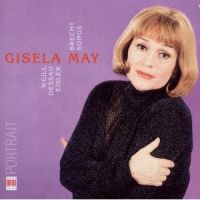 Gisela May, born in 1924, was discovered in 1957 by the composer Hanns Eisler, who admired her musicality and superb ability to project Brecht’s texts. She later joined the Berliner Ensemble, giving many legendary performances as Mother Courage. Until 2007 she acted in a long-running German television series. As she says in the booklet, "Anyone who knows me knows that I have sung Brecht songs all over the world. Anyone who doesn’t know me isn’t interested anyway." These songs were recorded between 1967 and 1976, and their atmosphere renders them compelling. Unlike Lotte Lenya’s later recordings, there’s never a hint of caricature in the way that May sings. Despite her throaty, guttural rasp she’s incredibly musical and charismatic, and helped by wonderful, idiomatic accompaniments; close your eyes and you’re transported to a cellar bar in Weimar Berlin. The Kurt Weill numbers come first, the best being the excerpts from The Seven Deadly Sins. Settings by Hosalla. Medek, Fischer and Dessau serve to highlight how much more successful Weill and Eisler were at capturing the essence of these texts. Compare Dessau’s version of Song of a German Mother with Eisler’s, and you sense the difference between talent and genius. The Eisler songs are the treasures on this disc, and if you’ve never heard anything by this fascinating Schoenberg pupil, start here: few other composers managed to combine sophistication and ready accessibility so well. Check out the use of Wagner’s Tristan motif in the Kuppelied. Alas, Berlin Classics provide no lyrics, so you’ll have to reach for your copy of John Willett’s Brecht translations for enhanced listening pleasure. Find Gisela May on Amazon
Gisela May, born in 1924, was discovered in 1957 by the composer Hanns Eisler, who admired her musicality and superb ability to project Brecht’s texts. She later joined the Berliner Ensemble, giving many legendary performances as Mother Courage. Until 2007 she acted in a long-running German television series. As she says in the booklet, "Anyone who knows me knows that I have sung Brecht songs all over the world. Anyone who doesn’t know me isn’t interested anyway." These songs were recorded between 1967 and 1976, and their atmosphere renders them compelling. Unlike Lotte Lenya’s later recordings, there’s never a hint of caricature in the way that May sings. Despite her throaty, guttural rasp she’s incredibly musical and charismatic, and helped by wonderful, idiomatic accompaniments; close your eyes and you’re transported to a cellar bar in Weimar Berlin. The Kurt Weill numbers come first, the best being the excerpts from The Seven Deadly Sins. Settings by Hosalla. Medek, Fischer and Dessau serve to highlight how much more successful Weill and Eisler were at capturing the essence of these texts. Compare Dessau’s version of Song of a German Mother with Eisler’s, and you sense the difference between talent and genius. The Eisler songs are the treasures on this disc, and if you’ve never heard anything by this fascinating Schoenberg pupil, start here: few other composers managed to combine sophistication and ready accessibility so well. Check out the use of Wagner’s Tristan motif in the Kuppelied. Alas, Berlin Classics provide no lyrics, so you’ll have to reach for your copy of John Willett’s Brecht translations for enhanced listening pleasure. Find Gisela May on Amazon
Watch Gisela May perform:
The future of Arts Journalism
You can stop theartsdesk.com closing!
We urgently need financing to survive. Our fundraising drive has thus far raised £49,000 but we need to reach £100,000 or we will be forced to close. Please contribute here: https://gofund.me/c3f6033d
And if you can forward this information to anyone who might assist, we’d be grateful.

Subscribe to theartsdesk.com
Thank you for continuing to read our work on theartsdesk.com. For unlimited access to every article in its entirety, including our archive of more than 15,000 pieces, we're asking for £5 per month or £40 per year. We feel it's a very good deal, and hope you do too.
To take a subscription now simply click here.
And if you're looking for that extra gift for a friend or family member, why not treat them to a theartsdesk.com gift subscription?
more Classical music
 Classical CDs: Bells, birdsong and braggadocio
British contemporary music, percussive piano concertos and a talented baritone sings Mozart
Classical CDs: Bells, birdsong and braggadocio
British contemporary music, percussive piano concertos and a talented baritone sings Mozart
 Siglo de Oro, Wigmore Hall review - electronic Lamentations and Trojan tragedy
Committed and intense performance of a newly-commissioned oratorio
Siglo de Oro, Wigmore Hall review - electronic Lamentations and Trojan tragedy
Committed and intense performance of a newly-commissioned oratorio
 Alfred Brendel 1931-2025 - a personal tribute
A master of feeling and intellect
Alfred Brendel 1931-2025 - a personal tribute
A master of feeling and intellect
 Aldeburgh Festival, Weekend 2 review - nine premieres, three young ensembles - and Allan Clayton
A solstice sunrise swim crowned the best of times at this phoenix of a festival
Aldeburgh Festival, Weekend 2 review - nine premieres, three young ensembles - and Allan Clayton
A solstice sunrise swim crowned the best of times at this phoenix of a festival
 RNCM International Diploma Artists, BBC Philharmonic, MediaCity, Salford review - spotting stars of tomorrow
Cream of the graduate crop from Manchester's Music College show what they can do
RNCM International Diploma Artists, BBC Philharmonic, MediaCity, Salford review - spotting stars of tomorrow
Cream of the graduate crop from Manchester's Music College show what they can do
 Classical CDs: Bells, whistles and bowing techniques
A great pianist's early recordings boxed up, plus classical string quartets, French piano trios and a big American symphony
Classical CDs: Bells, whistles and bowing techniques
A great pianist's early recordings boxed up, plus classical string quartets, French piano trios and a big American symphony
 Monteverdi Choir, English Baroque Soloists, Suzuki, St Martin-in-the-Fields review - the perfect temperature for Bach
A dream cantata date for Japanese maestro and local supergroup
Monteverdi Choir, English Baroque Soloists, Suzuki, St Martin-in-the-Fields review - the perfect temperature for Bach
A dream cantata date for Japanese maestro and local supergroup
 Aldeburgh Festival, Weekend 1 review - dance to the music of time
From Chekhovian opera to supernatural ballads, past passions return to life by the sea
Aldeburgh Festival, Weekend 1 review - dance to the music of time
From Chekhovian opera to supernatural ballads, past passions return to life by the sea
 Dandy, BBC Philharmonic, Storgårds, Bridgewater Hall, Manchester review - a destination attained
A powerful experience endorses Storgårds’ continued relationship with the orchestra
Dandy, BBC Philharmonic, Storgårds, Bridgewater Hall, Manchester review - a destination attained
A powerful experience endorses Storgårds’ continued relationship with the orchestra
 Hespèrion XXI, Savall, QEH review - an evening filled with laughter and light
An exhilarating exploration of innovation in 16th and 17th century repertoire
Hespèrion XXI, Savall, QEH review - an evening filled with laughter and light
An exhilarating exploration of innovation in 16th and 17th century repertoire

Add comment